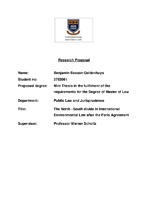| dc.contributor.advisor | Scholtz, Werner | |
| dc.contributor.author | Geldenhuys, Benjamin Basson | |
| dc.date.accessioned | 2021-03-29T08:51:50Z | |
| dc.date.available | 2021-03-29T08:51:50Z | |
| dc.date.issued | 2021 | |
| dc.identifier.uri | http://hdl.handle.net/11394/8068 | |
| dc.description | Magister Legum - LLM | en_US |
| dc.description.abstract | Global climate change is a serious, severe, and potentially irreversible problem. If no actions are taken to curb greenhouse gas emissions, global temperatures and sea levels will rise, wreaking havoc on earth, particularly in developing countries. The Stockholm Declaration of 1972 facilitated the first international consensus concerning the application of CBDR to international environmental problems. This was in reaction to the developing countries refusal to adhere to the same standards as the developed countries as they perceived this as a burden to their economic growth, which is unjust due to the developed countries historical culpability. | en_US |
| dc.language.iso | en | en_US |
| dc.publisher | University of the Western Cape | en_US |
| dc.subject | North-South divide | en_US |
| dc.subject | Relevance | en_US |
| dc.subject | Autonomously | en_US |
| dc.subject | Paris agreement | en_US |
| dc.subject | Climate change | en_US |
| dc.title | The North –South divide in international environmental law after the Paris agreement | en_US |
| dc.rights.holder | University of the Western Cape | en_US |

